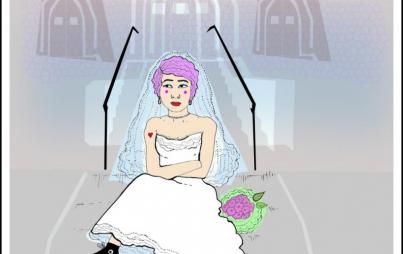
Credit: Thinkstock
I spent most of this past Saturday going through my closet at my parents’ house and doing some serious downsizing and rearranging. Seriously, there was stuff in that closet from five years ago that I forgot I even still owned. I said goodbye to party dresses that are still in great shape, and I hope someone has as much fun wearing them as I did.
After the closet cleansing, my mom pointed out the box of books that has been sitting in the corner for years and said, “Why don’t you go through those books. I’m going to drop off some old books to the library.” Usually I’m loathe to give up any books. I find comfort in books and while I’m not a total luddite (I heart my Kindle) I feel at peace surrounded by books. This time, as I began sorting through the box, my pile of books to donate kept growing. It seems that this box was full of books that may best be found in the “Christian Inspiration” section of Barnes and Noble. Some of the books were pretty heavy theological stuff—Thomas Merton, St Augustine—while others were fluff. a.k.a. 95% of what is sold as Christian Inspiration.
This collection of books, and the even larger one in the family storage unit, represents years of my life; years where I believed in something so deeply it affected every area of my life. It’s ironic that I symbolically packed up that area of my life at the beginning of the season of Advent. For those of you not familiar, Advent is the time of preparing and waiting for the birth of Jesus Christ. When I was an Anglican, every Sunday before Christmas involved reading a bit from the Gospels of the tale of how Mary and Joseph ended up in a manger in Bethlehem. Every day from December 1st until the 25th involves a reflection of some sort.
My reflection this season is how bare bones my spiritual life, for lack of a better term, has become. I believe in a higher power, I think Jesus was a pretty cool guy and our inner being moves on after death. Now it’s simply facing the choice of building up something new from there or clearing everything out of the spiritual closet and leaving it empty.
When I wrote my last piece on faith not too long ago, I’d have said the latter, but I’m wondering how much has been reactionary to how much I’ve come to despise about white American Christianity. It’s the realization that I had equated American evangelicalism to the faith as a whole when there is the old mainline denominations (your Methodist, Lutherans, Episcopalians, etc.) with its own ways of looking at faith. It’s also the reflection on my past and recognizing that I’ve attended churches where the demographic was 99% white and middle class to rich. The churches made up of POC and marginalized groups have their own dynamic.
In the aftermath of the death of Mike Brown and then the non-indictment of Darren Wilson, thinkers, writers and theologians of color have been vocal in calling out the white Christian establishment (me) on social media for its inaction, apathy and outright dismissal of the pain felt by black Americans. They’ve been pointing out that the legacy of this “Christian” nation has been built on slavery and genocide. Local faith leaders have been a huge part in organizing protests and helping out the community of Ferguson.
Much of this stems from what’s called liberation theology; the idea that since Jesus centered his life and ministry around the marginalized, so should the Church. That population should lead, not those in power in our society (rich, white, men). I haven’t cracked open my Bible in an age, but I’ve been devouring blog posts and Twitter threads. I’m going to use some of the money I might get over Christmas to buy A Theology of Liberation by Gustavo Gutiérrez (considered the definitive book on the subject) and The Cross and the Lynching Tree by James H. Cone (which is highly recommended.)
I almost titled this piece, “Losing My Religion In The Season of Advent,” because for a long time now, that’s what it felt like was happening. Honestly, that may still happen, but as a white person living in America, I figure I owe it to explore other manifestations of the faith I once held dear. That it’s time to listen and read and speak up among my peers who say some really problematic shit. Maybe I’ll find something like faith at the end, maybe I won’t, but I think I’ll look anyway.
This story first appeared at Persephone Magazine, a daily blog focused on topics of interest for modern, intelligent, clever women.







